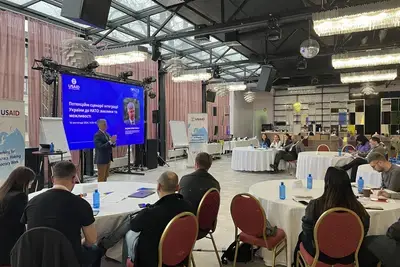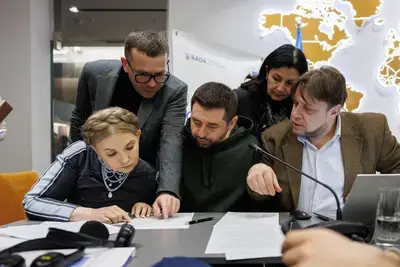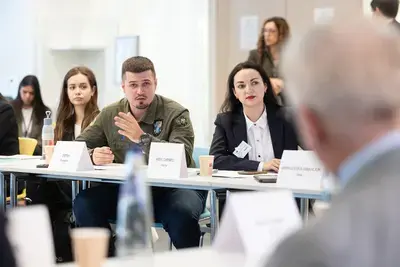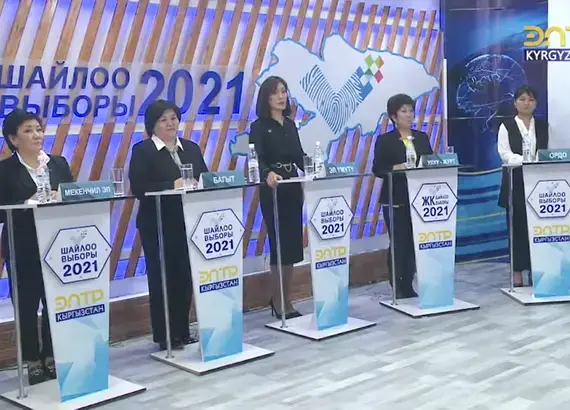
Success Story
Rebuilding Voter Trust Through Parliamentary Debates
Kyrgyzstan held parliamentary elections in November 2021, following a year-long political transition. Preceding constitutional reforms handed greater powers back to the executive, while electoral reforms created a mixed electoral system. The new system combined electing some members by party list and others in single-mandate constituencies on a majority basis. The elections were important to rebuild citizens’ trust in democratic processes and engage voters in issue-based discussions. As part of a USAID/CEPPS program on responsive politics, NDI supported televised debates in seven different regions of Kyrgyzstan enabling voters to make an informed choice. In total, 198 single-mandate candidates, and a number of women and youth candidates from all 21 contesting political parties participated in the debates.
Karim Khanjeza was one of 288 candidates running for 36 single-mandate seats in Jogorku Kenesh, the Kyrgyz Parliament. “It was challenging to raise my profile among potential voters given the limited campaign budget. Participation in the televised debates gave me a unique opportunity to reach my audience and inform voters about my platform,” Khanjeza, now an elected MP from Chui region, explained. Debates not only help voters make informed decisions, but they also refocus the candidate’s attention on the public and the issues they are facing, promoting further accountability and engagement.
To fulfill a quota requirement, political parties can nominate at least 30% of women candidates and at least 15% of young candidates for their party lists. In this election, however, voters could also select their preferences within the party lists of candidates, which elects top preferred candidates regardless of quotas. To give an additional voice and platform to underrepresented groups of candidates, NDI worked with the State TV and Radio Broadcasting Company (EILT) to produce special debates featuring 42 youth and women party candidates. They discussed economic, social issues, infrastructure and foreign policy topics at a national level. Seven political parties also took advantage of pre-debate consultations with NDI’s international debate expert to prepare their candidates. Party candidates, mostly women, practiced their speeches, learned debating format and discussed strategies to present their programs and platforms. As noted by Nurzhan Pazylova, a candidate from El Ymuty political party, “Opinions and recommendations shared by the expert helped me to feel confident and present with professionalism and respect. I’m sure it improved my chances.” Although her party did not pass the threshold in the November elections, Ms Pazylova is confident that her participation in the debates prepared her to better articulate her goals and ideas as she continues to seek opportunities to improve her community.
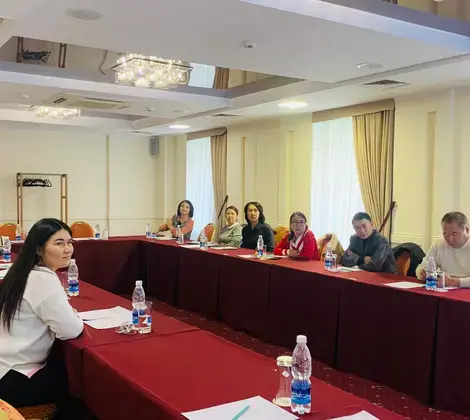
Electoral debates are not new to Kyrgyzstan. For many years NDI, known for its global expertise and networks, cooperated with election authorities, political parties and a major Kyrgyz broadcaster to produce national electoral debates. However, bringing debates to the local, constituency level was a new challenge: none of the local broadcasters had prior experience or knowledge of conducting electoral debates. “It was the first time that we organized televised debates for the parliamentary elections,” said Burmagul Chabdarova, a TV host from the regional media center in Talas. “Before that, we only watched them on national television.”
In Osh and Bishkek, the Institute trained 22 producers and moderators from seven regional broadcasters to facilitate unbiased, policy-focused discussions and organize televised debates. Moderators practiced how to elicit candidate responses related to party platforms, developed questions on topics of citizen concern and learned the format and rules of the debates. “It was very useful, and we learned a lot of technical information: where to put podiums, where to stand, how to moderate. Coming back from training, I shared all this information with my entire team, which inspired us to conduct debates at a good professional level,” said Chabdarova.
NDI’s work over the years has helped to institutionalize a sustainable culture of debate in Kyrgyzstan, with local experts increasingly taking the lead. Along with NDI-supported regional debates, another series of party debates were produced by the main national broadcaster, Kyrgyz Television Radio Corporation (KTRK), the Institute’s long-term partner. Having gained experience by working with NDI over successive electoral cycles, KTRK this time was able to independently host a series of debates for the leaders of political parties.
With both media and candidates taking greater ownership over issue based discourse, focusing on citizen interests, Kyrgyzstan took another step forward in promoting debate culture. These debates reinforced voter choice and demonstrated how transparency can be an integral part of the electoral process.
NDI's engagement in Kyrgyzstan is implemented with support from the United States Agency for International Development (USAID) through the Consortium for Elections and Political Process Strengthening (CEPPS).
